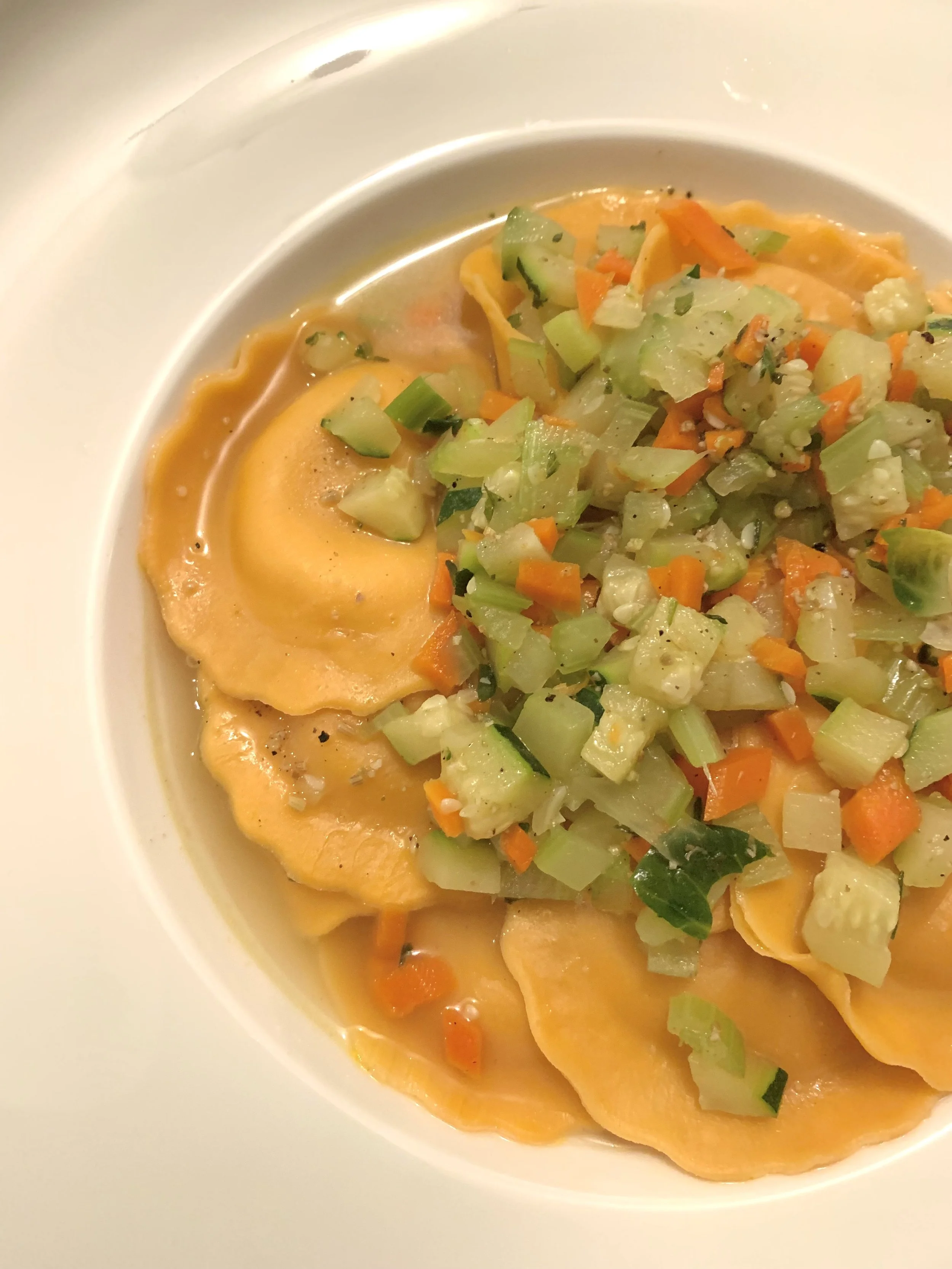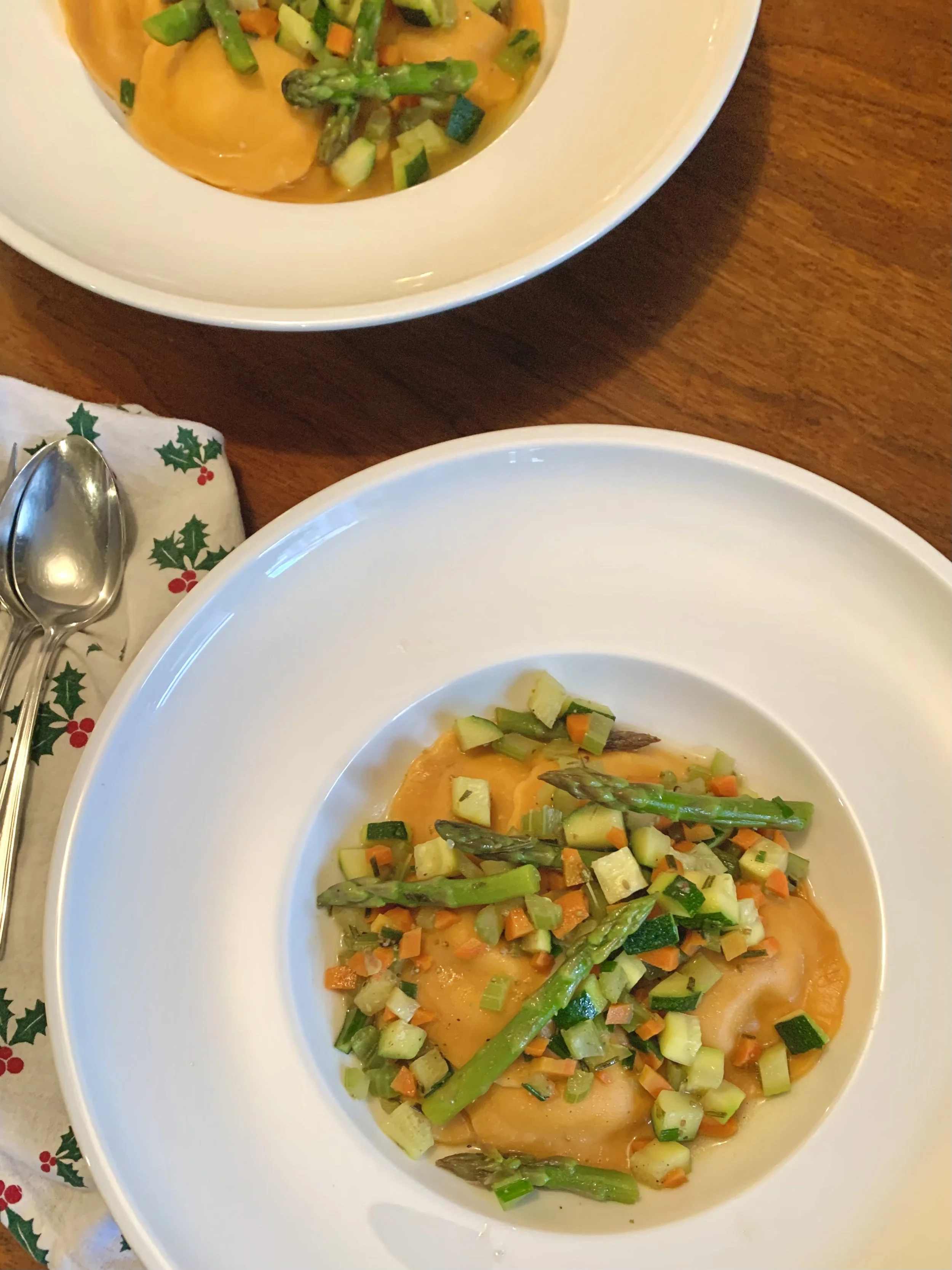Ravioli and Mirepoix in a Broth
Hi I’m Evangeline! Welcome to my blog. I am mom and lover of all things health and wellness. By profession- a Registered Massage Therapist and Yoga & Ayurveda consultant. I started this blog back in the early days of Covid19 as a way to stay in touch with my clients, and it’s grown into a space to share what I love most. Here you’ll find health tips and nourishing recipes I make for my family, sprinkled with Ayurveda and Yoga wisdom. My hope is that these posts inspire you to care for yourself in small, joyful ways and feel a little more balanced in everyday life.
We are in the midst of getting ready for the holidays with a winter storm forecast tomorrow. Aahhh…winter. It appears we will have a white Christmas. When it comes to winter meal planning nothing but warm and comforting come to mind. Today, pasta was the comfort. Butternut squash ravioli needed trying out, bought for an upcoming Christmas gathering, and with it, mirepoix. Mirepoix, the technical term I picked up from chefs at a restaurant I had worked at, and as a kid I have vivid memories of my mom stuffing in cubes of carrots, celery and onions in the Christmas turkey. My Ayurvedic version of mirepoix includes carrots, celery and zucchini cooked in spices.
Ayurveda has a huge influence in our kitchen and day to day living. Though Ayurveda is the traditional health system from India, I find Ayurvedic guidelines can be applied to any style of cooking. I owe a lot to my Ayurvedic teacher, Vaidya Rama Kant Mishra, who was not only a great healer and herbal formulator, but shared practical ways to create balanced, healthy meals using different spice combinations based on their medicinal qualities.
Spices and Herbs in Ayurveda
Spices and herbs add not only add flavour to any food, but viewed as having medicinal qualities as recognized in Ayurveda, such as their metabolic effect, their action and post-digestive effect. If you’re new to cooking with spices, buy spice mixes to get an idea of the tastes you like. I have fennel, coriander, turmeric and cumin always in stock as they help with digestion and absorption of nutrients. I add turmeric daily in our cooking as it keeps the liver clean. Dr Mishra would say turmeric is “a friend to the liver”, and cooking with it gives great benefits. For example, turmeric cleans the liver and purifies the blood. Turmeric, however, should not be consumed in capsule form or as a tea on a regular basis as it would be too heating for the liver, an organ that easily overheats. Cook with it instead, a bit here and there, as it in needs an oil medium to activate it’s anti-inflammatory and anti-viral compounds, and other benefits modern science has discovered. In Ayurveda and Chinese Medicine, the liver is considered just as important an organ as the heart. The liver is like a non-stop factory responsible for filtering blood, and a multitude of other tasks such as processing food, drinks, drugs, alcohol and supplements, making vitamins, minerals and cholesterol, storing energy, making and secreting bile and detoxifying the body. You may be surprised to know that fatty liver is a more common condition nowadays, known as Non- Alcoholic Fatty Liver Disease (NAFLD), though traditionally caused by over consumption of alcohol, but more often than not it is caused by over consumption of trans-fats from hydrogenated oils and over processed vegetable oils- the kind of oils you find in processed and take-out foods. I have had a couple of clients presenting with NAFLD not caused by over consumption of alcohol.
As Ayurveda recognizes spices and herbs as medicinal, onions and garlic are two members of the allium family that have potent antibacterial properties, which, yes is a good thing for fighting flus and colds. In Ayurveda, however, garlic and onions are not recommended for daily consumption as they may dampen one’s spiritual practice. They are also very high in sulfur compounds and have the ability to destroy not just the bad bacteria, but the good bacteria in our gut, not being able to differentiate between the two. Our gut flora is responsible for keeping our digestive system in good order. Since most illnesses can be traced to the gut, maintaining a good functioning digestive system is vital for good health. This has been proven my modern science, that the gut has a direct relationship to your physical and mental health. It is for this reason, we avoid garlic and onions in cooking.
Ravioli and Mirepoix in a Broth
Yields: 2 Servings
Prep Time: 10 minutes
Cooking Time: 20 minutes
INGREDIENTS
Mirepoix and broth
1 tsp ghee or olive oil
½ tsp ground fennel
½ tsp ground coriander
⅛ tsp ground black peppercorns
1 Tablespoon fresh rosemary, or ⅓ tsp dried
½ cup carrots cubed - 1 small
½ cup celery cubed - 1 stalk
½ zucchini cubed - ½ of a medium size
8 asparagus tips (optional)
1 cup broth or spring water
¼ tsp soma salt
DIRECTIONS
Boil water in a medium-large saucepan for cooking the ravioli in. Follow the cooking instructions, but cook the ravioli in the boiling water towards the last 3-4 minutes of making the mirepoix with broth.
To make the mirepoix and broth, in pan on medium heat, sauté spices and rosemary in the ghee or olive oil.
When the aroma of the spices are released add the cubed carrots with a splash of water and cover with a lid. Cook for a minute. Lock in the juices of the vegetables by covering the pan with a lid, as each vegetable is added, from hardest to softest.
Add the celery, then zucchini, and last asparagus tips if desired. Add the ½ cup of water with the asparagus. Cover with the lid one last time and cook asparagus for a couple of minutes until just tender.
Plate the ravioli, using a slotted spoon to remove from the pot.
Salt the mirepoix and broth and delicately spoon it out over the ravioli.


